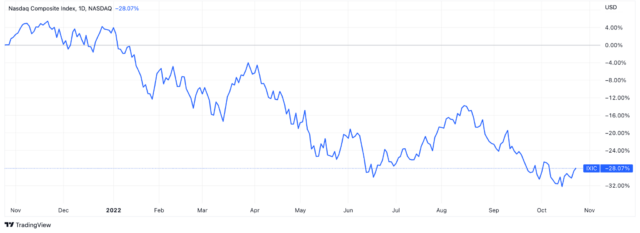
Let’s call it what it is: a bear market. The US stock market has been on a slow and steady
decline this year thanks to the economic crisis, finding fresh lows on a regular basis. Any time the market begins to decline, investors wonder how far down it’ll go — but that’s nearly impossible to predict. They say the average bear market lasts 289 days. How long do we have left?
For example, one of the most important indices in the region, the Nasdaq Composite Index, has fallen by 28% over the last 12 months so far. But, one man’s trash is another’s treasure, and even in this declining market there are some stocks that managed to hit gold – and one of them is T-Mobile US. Let’s find out why a telecom provider has managed to stay ahead of the game in a world where nobody even likes talking on the phone.
Firstly, we’ll take a look at the Nasdaq Composite index in order to get an accurate comparison of T-Mobile’s numbers against the overall market.
The Nasdaq is a tech-heavy index and includes the stock of all companies listed on its namesake exchange. It’s been struggling through 2025 and it’s looking like the index could close the year with losses of over 28%, unless Santa brings a bull market with him this December. But in our humble opinion, Christmas miracle won’t happen.
The reason for this unhappy picture is a long-term crisis that started all the way back in mid-2019, when already multiple analysts were arguing that the American market was overpriced. Not long after, Covid-19 came along and made the global situation much worse, and as soon as that drama died down we were met with a large-scale military conflict which escalated the decline as fears of energy disruption became apparent. It’s likely to be a bumpy road ahead for the remainder of 2025. But, crash or no crash, recession or not, history tells us time and time again this is part of the journey. Economic data suggests stocks should begin recovering by late 2025 or early 2025.
What a time to be alive, eh?

The bearish trend is unlikely to see a reversal into the bullpen any time soon thanks to the current economic situation around the world. The consequences of these events connect the financial markets across the world, and ultimately mean that almost everyone on the planet is now facing increasing inflation and rising consumer prices. So naturally, the central banks of the world stepped up to do what they do best: raise interest rates to temper inflation. The Fed is one of the most aggressive globally toward rate hikes, and each one sends a bearish shudder through the market. Investors should be cautious of any buys amid the bear market and Fed rate hikes.
While all this is going on though, T-Mobile US has seen its stock pop nearly 20% so far this year. We know, WTF?
Investors and analysts alike seem to have faith in this brand’s long-term growth potential and think there are unlimited opportunities for consumer growth here. Contributing to that is the 5G network that T-Mobile is developing for itself – more and more US states focus on improving their connection networks, and T-Mobile has positioned itself at the forefront of this endeavor (along with a few competitors). At the end of 2025, T-Mobile’s midband 5G network reached 210 million people. T-Mobile expects the network to cover 300 million by 2025. Also, T-Mobile continues to expand 5G fixed broadband services to residential customers, taking on cable TV companies. It’s targeting 7 million to 8 million fixed broadband customers by 2025.
Another contributing factor is the $14bn buyback program the brand announced on September 8 through September 2025, including up to $3 billion through the remainder of 2025, which saw the company – you can clearly see the stock react on the chart above. See that short raise on the chart above. At a Goldman Sachs financial conference, Chief Executive Mike Sievert said management’s long term goal of up to $60 billion of share repurchases remains intact.
T-Mobile is not without pressure though, one of the key ones being inflation (though to tell the truth that’s impacting literally everyone) which could bring down future earnings potential and continue to increase costs.

Nevertheless, most analysts have assigned T-Mobile as a ‘Strong Buy’ rating and think the stock is undervalued right now with a high potential for future earnings growth. Music to investors’ ears, right?
An average estimation by experts is for an upside of +24% in the next 12 months, even though the US market overall faces bearish sentiment – in fact, the consensus is that the bear market has yet to even find a bottom.
One may wonder if it’s a good time to invest right now. Well, no one can know for sure what the future holds, especially the short term future. But looking back at history if you’ve got a long enough investment time frame, the best time to invest is when the market has crashed. During a market downturn, stock prices are often much lower. Even the highest-priced stocks are heavily discounted right now, with some of them down more than 50% which means there are many stocks that are cheap. And if you believed in the companies six months or a year ago, has anything really changed now, other than the stock price?
Mentally, it can be a really hard time to invest because there’s no way to know if the market will fall further from this point. Just because a stock has suffered a precipitous decline does not mean it won’t carry on its losing streak. But if you have the stomach for it, and you have enough time to ride out the ups and downs, you could set your portfolio up for some serious long term gains.
See, there’s always growth in adversity, if you look hard enough. However, before planting any seeds, make sure to always do your own research.














